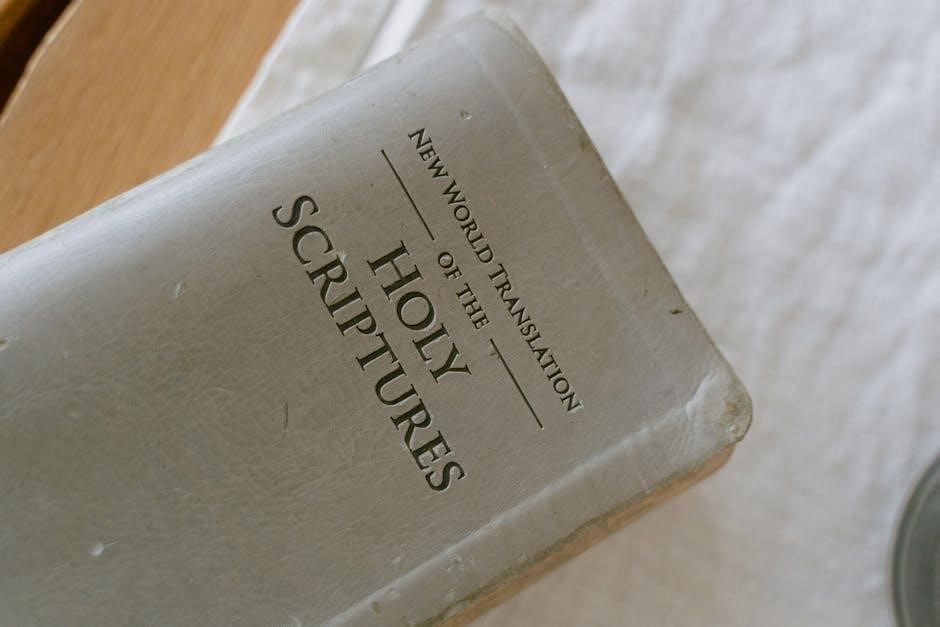
This guide explores C.S. Lewis’s timeless work, offering structured questions and reflections to deepen understanding of Christian principles and their relevance in modern life.
Overview of C.S. Lewis and His Influence
C.S. Lewis, a renowned Christian author, philosopher, and theologian, has profoundly shaped modern Christian thought. His works, particularly Mere Christianity, have bridged faith and reason, making complex theological concepts accessible. Originally broadcast as WWII radio talks, the book remains a cornerstone of Christian literature, influencing countless readers. Lewis’s ability to articulate Christianity’s essence has solidified his legacy, inspiring scholars, educators, and everyday believers. His ideas continue to resonate, fostering deeper faith understanding and sparking meaningful discussions across generations.
Importance of Mere Christianity in Christian Literature
Importance of Mere Christianity in Christian Literature
Mere Christianity stands as a foundational text in Christian literature, offering a clear, accessible exploration of faith. Originally broadcast during WWII, its timeless insights have made it a cornerstone for understanding Christianity. Lewis’s ability to bridge faith and reason has resonated with diverse audiences, solidifying its influence. The book’s universal appeal lies in its logical yet empathetic approach, making it a favorite for those exploring Christianity or deepening their faith. Its impact on Christian thought and apologetics is unparalleled, making it an essential resource for personal and group study, fostering spiritual growth and intellectual engagement.

Key Themes and Concepts in Mere Christianity
C.S. Lewis explores core Christian teachings, emphasizing the universal moral law, faith, and morality. He connects these concepts to practical living, providing a logical, timeless framework for understanding Christianity’s essence.
The Law of Human Nature and Moral Arguments for God
C.S. Lewis argues that a universal moral law exists within humanity, suggesting a divine source. He contends that the presence of moral awareness across cultures points to God’s existence. This concept, central to Mere Christianity, forms the foundation of his apologetics, emphasizing that moral truths cannot be explained by naturalism alone. The study guide helps participants explore this idea, encouraging them to reflect on how morality aligns with Christian teachings and strengthens the case for God. Through structured discussions, readers can deepen their understanding of this pivotal argument and its relevance to faith and everyday life.
Christian Behavior and the Role of Faith in Everyday Life
C.S. Lewis emphasizes that genuine faith transforms daily living, influencing actions and decisions; He highlights the importance of moral conduct rooted in Christian principles, advocating for humility, forgiveness, and love. The study guide delves into how Lewis connects faith with practical behavior, encouraging believers to integrate their beliefs into every aspect of life. Through reflections and discussions, participants explore how Christian ethics shape relationships, work, and personal growth, fostering a deeper commitment to living out their faith authentically and intentionally in a world that often challenges such values.
How to Use This Study Guide Effectively
Engage with structured questions, participate in small group discussions, and reflect on key themes to deepen your understanding and application of Lewis’s teachings in daily life.
Preparing for Discussions and Reflecting on Key Questions
Effective preparation involves reviewing each chapter, engaging with study questions, and reflecting on personal beliefs. Structured discussions encourage deeper insights into Lewis’s arguments. Small group settings foster collaboration, while personal reflection deepens understanding. The guide’s exercises help apply theological concepts to everyday life, ensuring a comprehensive grasp of Christian principles. Regular review and thoughtful engagement with key questions enhance the learning experience, making the study guide a valuable tool for both individual and group exploration of Mere Christianity.
Integrating the Material into Personal Faith and Small Group Settings
Integrating the teachings of Mere Christianity into personal faith involves reflecting on Lewis’s arguments and applying them to daily life. Journaling and prayer can deepen understanding, while group discussions foster shared insights. Small group settings provide a supportive environment to explore complex ideas collectively. The study guide’s structured approach helps participants connect theological concepts to real-life experiences, enriching both personal and communal faith journeys; This integration bridges the gap between theory and practice, making Christianity a lived experience rather than mere doctrine.

Historical Context of Mere Christianity
Mere Christianity originated as a series of BBC radio talks during World War II, offering spiritual guidance amid global turmoil, shaping its enduring relevance and appeal.
Origins as World War II Broadcast Talks
C.S. Lewis’s Mere Christianity began as a series of radio broadcasts on BBC during World War II, aiming to address spiritual questions in a time of crisis. These talks were accessible to a broad audience, offering moral and theological insights to comfort and guide listeners. Lewis’s clear, logical approach resonated deeply, making complex Christian doctrines understandable. The broadcasts were later compiled into a book, preserving their message for future generations. This historical context underscores the timeless relevance of Lewis’s work, born out of a period of global uncertainty and human reflection.
Its Impact on Christian Apologetics and Modern Readers
C.S. Lewis’s Mere Christianity has profoundly shaped Christian apologetics, offering a rational defense of faith that resonates across generations. Its accessible language and logical arguments have bridged the gap between theology and everyday life, making it a cornerstone for modern readers seeking spiritual clarity. The book’s enduring popularity reflects its ability to address universal questions about morality, faith, and humanity’s search for meaning. Today, it remains a vital resource for believers and skeptics alike, continuing to inspire and challenge readers in a rapidly changing world, solidifying its place as a timeless work of Christian thought and apologetics.

Theological and Philosophical Insights
C.S; Lewis’s Mere Christianity explores profound theological and philosophical concepts, offering a rational defense of Christianity. His arguments for God’s existence and the nature of faith continue to resonate with modern readers, blending logic with spiritual insight to address universal questions of morality and belief.
Arguments for God’s Existence and the Nature of Christianity
C.S. Lewis presents compelling arguments for God’s existence, emphasizing the universal moral law as evidence of a divine source. He argues that humanity’s inherent sense of right and wrong points to a higher authority, suggesting that atheism fails to fully explain this moral framework. Lewis also explores Christianity as both a diagnosis of humanity’s flawed nature and its cure through faith in Christ; His reasoning blends philosophical logic with theological insight, making Mere Christianity a powerful apologetic for modern audiences seeking rational foundations for belief.
Addressing Doubts and Strengthening Faith Through Reason
Lewis tackles common doubts about Christianity with rational arguments, encouraging believers to engage their intellect alongside their faith. He addresses questions like the problem of suffering and the credibility of miracles, offering logical responses that strengthen faith. Lewis emphasizes that doubt, when approached thoughtfully, can deepen spiritual understanding rather than undermine it. By integrating reason with belief, Mere Christianity provides a balanced approach to faith, helping readers navigate challenges and emerge with a stronger, more informed belief in God and His grace.

Practical Application of Mere Christianity
This section focuses on applying Lewis’s teachings to everyday life, helping readers transform their thoughts and actions through practical exercises and discussions to deepen their understanding of Christian principles.
Transforming Thoughts and Actions Through Lewis’s Teachings
Lewis’s insights guide readers to align their lives with Christian values, fostering a deeper understanding of faith and morality. Through practical exercises and reflections, this study guide helps transform thoughts into actions, encouraging readers to embody Christian principles in their daily lives. The workbook format allows for personal growth, enabling individuals to confront doubts and strengthen their faith. By integrating Lewis’s teachings, participants can develop a more intentional approach to living out their beliefs, creating a meaningful connection between theology and real-world application. This section equips learners to apply timeless truths in contemporary contexts, enriching both personal and communal faith journeys.
Using the Workbook to Deepen Understanding and Discussion
The workbook accompanying this study guide is designed to enhance comprehension and foster meaningful conversations. Through structured questions and reflective exercises, participants can delve deeper into Lewis’s arguments and their personal implications. Each chapter is divided into manageable sections, making it easy to engage with the material individually or in groups. The exercises encourage critical thinking and application of Lewis’s teachings to real-life scenarios, promoting a richer understanding of Christian principles. By actively engaging with the workbook, readers can transform theoretical concepts into practical wisdom, enriching their faith journey and fostering dynamic discussions in group settings.
C.S. Lewis’s timeless insights continue to inspire, making Mere Christianity a powerful guide for spiritual growth. Embrace its wisdom and explore more of his transformative works.
The Lasting Relevance of Mere Christianity in Today’s World
C.S. Lewis’s Mere Christianity remains a cornerstone of Christian thought, offering timeless wisdom on morality, faith, and reason. Its universal themes resonate across generations, addressing modern spiritual and ethical challenges with clarity and depth. The book’s origins as wartime broadcasts underscore its enduring appeal, providing hope and guidance during uncertain times. Today, it continues to inspire both believers and skeptics, serving as a bridge between traditional Christianity and contemporary life. Its relevance lies in its ability to transcend cultural and temporal boundaries, making it a vital resource for anyone seeking a deeper understanding of faith and its application in the world.
Encouragement to Continue Exploring Lewis’s Work
Exploring C.S. Lewis’s work beyond Mere Christianity offers profound insights into faith, philosophy, and literature. His writings, from Narnia to The Screwtape Letters, provide rich spiritual and intellectual stimulation. Engaging with his diverse works fosters a deeper understanding of Christian thought and its application in everyday life. Lewis’s ability to articulate complex ideas with clarity and wit makes his work accessible and engaging for readers of all backgrounds. Embracing his literary legacy invites readers to embark on a lifelong journey of spiritual and intellectual growth, enriching their faith and broadening their perspective on the world.